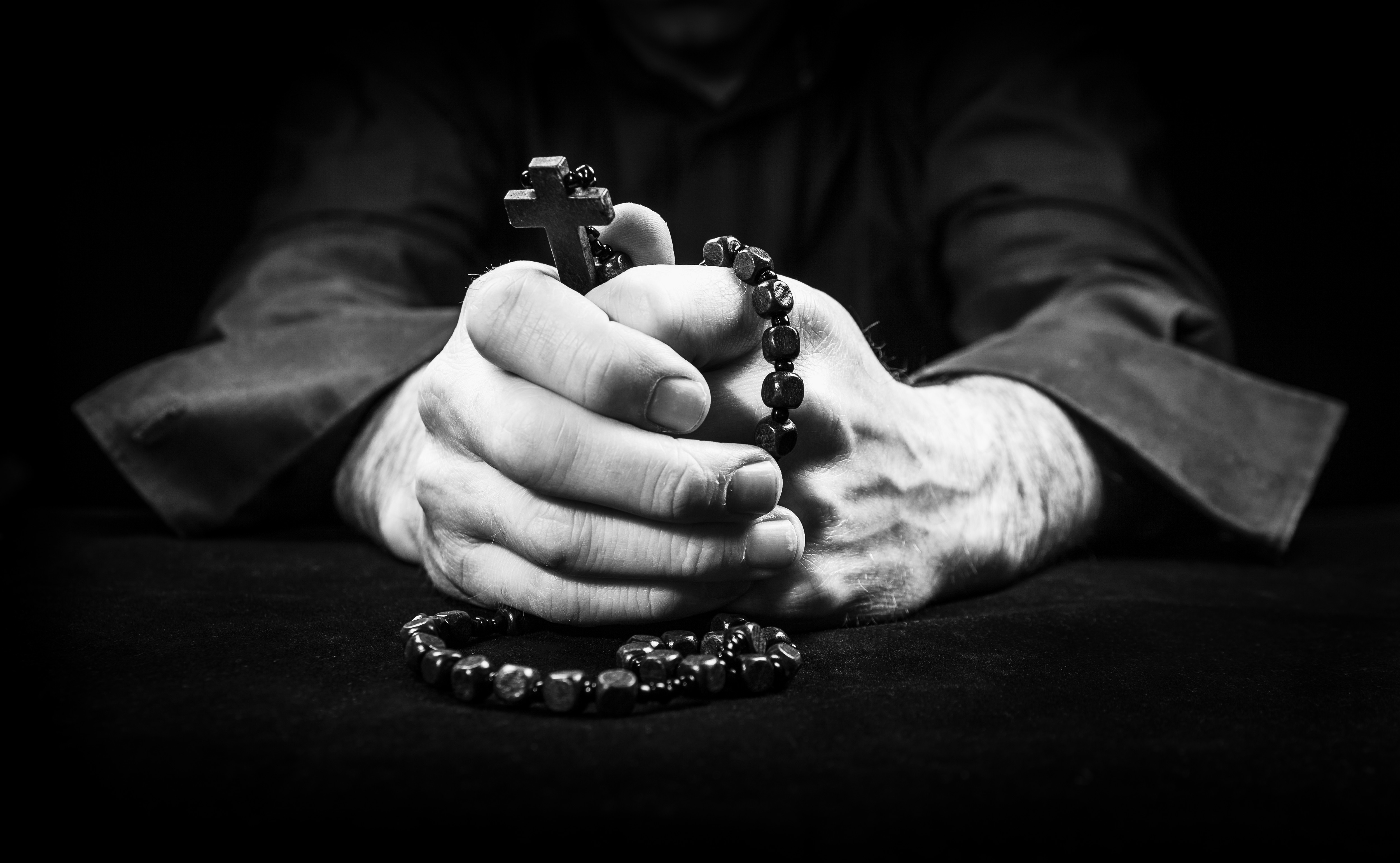Is America's obesity epidemic actually a spiritual crisis?
There are many reasons why Americans love to eat too much. Some may be rooted in our deepest existential anxieties.


A free daily email with the biggest news stories of the day – and the best features from TheWeek.com
You are now subscribed
Your newsletter sign-up was successful
Everyone knows that the U.S. has an obesity problem. While we're not the fattest nation on the planet, we do have the highest obesity rate among OECD countries.
We don't lack for explanations. Our lives have never been more sedentary. Our food is increasingly processed, abundant, and cheap. It's also often lacking in flavor, which can make eating it unsatisfying. When our food is flavorful, it's often intensely sweet, jacked up with processed sugars and artificial sweeteners that mold our palates to crave more of the same. The portions offered to us at restaurants are enormous, and we often find it extremely difficult to restrain ourselves. Many poor and working-class Americans live in what have been dubbed "food deserts," where fruits, vegetables, and other fresh foods are scarce, and high-calorie and high-fat foods are plentiful.
All of these and probably many other structural socio-cultural and economic factors play important roles in explaining how we got here — and in explaining why obesity rates have been going up in many other places around the globe over the past few decades.
The Week
Escape your echo chamber. Get the facts behind the news, plus analysis from multiple perspectives.

Sign up for The Week's Free Newsletters
From our morning news briefing to a weekly Good News Newsletter, get the best of The Week delivered directly to your inbox.
From our morning news briefing to a weekly Good News Newsletter, get the best of The Week delivered directly to your inbox.
My friend Michael Austin offers a different explanation. Michael's a talented writer and the provost of Newman University in Wichita, Kansas — and he weighs nearly 300 pounds. He confessed this, complete with an illustrative photograph, on his blog last week. Michael is going to try losing some weight, and he was refreshingly candid about how difficult this is likely to be — and about precisely why:
That I love food is simply one of those terrible things that I know about myself. I am not talking about aesthetic pleasure. It's almost completely existential. Food makes me feel safe and loved. It reminds me that I am the sort of person who can eat whatever he wants whenever he wants to — which is actually a very reassuring thing to know about oneself. It doesn't matter if I'm hungry or not. I'm not trying to satisfy a physical craving by eating. I can't be bothered with such things when I am trying to solve an existential crisis.Food says, "Everything is OK in the world, at least for this one brief moment, and you don't have to worry about anything while you are swallowing." Not all food talks like this, of course. Vegetables never seem to say squat to me. Fruits and whole grains whisper "things might not be as bad as they seem," but this is a long way from speaking peace to my soul. That takes pastries, or bacon, or something deep fried at least. Fat and sugar say the nicest things. [Notes from the Overfed]
Michael sees his battle with obesity in spiritual terms — as an existential crisis. I wonder if we all might gain in self-understanding if we began to think of the so-called obesity epidemic, at least in part, as a food-focused spiritual or existential struggle that increasingly afflicts modern men and women.
Compared to members of other cultures — a Frenchman visiting several markets daily in search of fresh ingredients for a multi-course, labor-intensive evening meal; or a Japanese mother shopping for just the right cut of fish to serve her family for dinner — it can seem that Americans, with our enjoyment of eating processed and fast food, are decidedly less food-focused than others. But that's a deceptive way to think about it.
Americans spend a lot of time thinking about, worrying about, even obsessing about food. When our choices lead us to gain weight, we worry even more and begin looking for a diet to help us drop the weight. If it works and we lose a few pounds, many of us will gain them back before long in recoil from the asceticism.
A free daily email with the biggest news stories of the day – and the best features from TheWeek.com
And then there are the constant (often alarmist, sometimes contradictory) public health alerts: Eggs are bad! Margarine is good! On second thought, eggs are a great source of protein and what you really need to cut out is the carbs! But for God's sake, whatever you do, stay away from glutens!
Before long your BMI is way up and your doctor is alarmed, so you try some pills. And what seem like a million-and-one silver-bullet workouts. And CBT therapy. And hypnosis. And the fad diet endorsed by a celebrity and hocked on late-night infomercials that your overweight friend from high school swears by. Each of them helps a little, but never for long. Because you just can't seem to keep yourself from buying a gallon of ice cream every few days and polishing it off in a single sitting in front of the TV after the kids go to bed.
You get the idea. There are millions of stories like this. (I have some of my own.) Up and down. Gluttony and guilt. Binge and purge. (The last of those points toward the most severe cases — of people suffering from clinical eating disorders, like anorexia and bulimia, and others who opt for a radical surgical solution to their weight problems.)
Why do so many of us find it impossible to resist the gallon of ice cream, the bottomless plate of pasta, the Big Gulps and offers of endless soft-drink refills at the chain restaurant outside the mall?
If my friend's experience is at all common, at least part of the answer is that a lot of us go about much of our lives in a state that could be described as a low-grade anxiety attack. We stuff our stomachs with vast quantities of unhealthy food to soothe it, even if the resulting weight gain and worries about health problems ultimately contribute to making the anxiety worse.
What's going on here?
We find one helpful suggestion in, of all places, the pages of Martin Heidegger's philosophical masterwork Being and Time — at least part of which is concerned with exploring the multitude of ways that people flee from their mortality.
All of us know, intellectually, that we will die. But Heidegger suggests that we only come to grasp it existentially in the mood of anxiety. In anxiety, the average everyday pursuits that normally occupy and absorb us recede and appear drained of meaning. The arbitrariness of our lives and the world into which we've been thrown light up and we are left adrift, aware as we otherwise rarely are that the world and our lives hover over an abyss of nothingness into which we could tumble at any moment.
It can be a chilling experience — and so we flee from it, throwing ourselves more fully and more deeply into the world, finding comfort and solace in its seeming (but deceptive) solidity. Addiction and obsession are particularly intense forms of this fleeing into the world, Heidegger proposes, since they turn one particular entity within the world into the nearly exclusive focus of our existence.
But if that's the case, then an obsession with food — the consumption of which assimilates worldly entities into our very selves, causing a visceral feeling of fullness, which compensates for the haunting perception of existential emptiness that accompanies anxiety — may be among the most potent ways to ward off an existential crisis. At least for a brief period of time.
This doesn't explain why the United States would have more existential crises — and higher rates of obesity — than other places. But then again, much of the world appears to be catching up to us, perhaps indicating that, as with so many other aspects of advanced capitalism and modernity, America merely got here first.
In any case, Heideggerian phenomenology can't substitute for social or medical science when it comes to figuring out how we might begin to shrink our bulging waistlines. But it just might help us to illuminate the spiritual dimension of our chronic obesity — and maybe even inspire a modicum of self-understanding about why it's become a problem in the first place.
Damon Linker is a senior correspondent at TheWeek.com. He is also a former contributing editor at The New Republic and the author of The Theocons and The Religious Test.
-
 5 cinematic cartoons about Bezos betting big on 'Melania'
5 cinematic cartoons about Bezos betting big on 'Melania'Cartoons Artists take on a girlboss, a fetching newspaper, and more
-
 The fall of the generals: China’s military purge
The fall of the generals: China’s military purgeIn the Spotlight Xi Jinping’s extraordinary removal of senior general proves that no-one is safe from anti-corruption drive that has investigated millions
-
 Why the Gorton and Denton by-election is a ‘Frankenstein’s monster’
Why the Gorton and Denton by-election is a ‘Frankenstein’s monster’Talking Point Reform and the Greens have the Labour seat in their sights, but the constituency’s complex demographics make messaging tricky
-
 Notre Dame is a magnificent monument to a misunderstood age
Notre Dame is a magnificent monument to a misunderstood ageThe Explainer Every now and then, the stars align to create a virtuous cycle of creative brilliance, which illuminates civilization for centuries afterwards. The great cathedral arose in such an hour.
-
 4 competing theories on the theological meaning of Easter
4 competing theories on the theological meaning of EasterThe Explainer Christus Victor, satisfaction theory, moral exemplar, and penal substitution
-
Remember that you will die
The Explainer It's time for us to revive memento mori, the practice of remembering death
-
 Being Muslim in America
Being Muslim in AmericaThe Explainer Islam in the U.S. has a long, rich history, but fears of terrorism complicate the future. Here's everything you need to know.
-
 The twisted logic of evangelical colleges welcoming straight atheists and rejecting gay Christians
The twisted logic of evangelical colleges welcoming straight atheists and rejecting gay ChristiansThe Explainer At many evangelical colleges, you're better off godless than gay
-
 Terrence Malick's profoundly Christian vision
Terrence Malick's profoundly Christian visionThe Explainer The director's breathtaking new film, Knight of Cups, offers a movingly Christian outlook on life
-
 A pedophilia scandal is engulfing the oldest Catholic institution in France
A pedophilia scandal is engulfing the oldest Catholic institution in FranceThe Explainer Here's what you need to know
-
 5 ways to understand Christmas on a deeper level
5 ways to understand Christmas on a deeper levelThe Explainer From the metaphysical to the personal...
